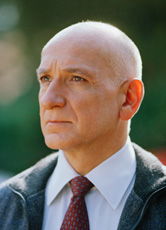|
House of Sand and Fog
|
| |
 |
USA, 2003. Rated R. 126 minutes.
Cast:
Jennifer Connelly, Ben Kingsley, Ron Eldard, Shohreh Aghdashloo, Jonathan Ahbout, Frances Fisher, Kim Dickens, Navi Rawat, Carlos Gomez, Kia Jam, Jaleh Modjallal
Writers: Vadim Perelman and Shawn Lawrence Otto, based on the book by Andres Dubus III
Original Music: James Horner
Cinematography: Roger Deakins
Producers: Michael London, Vadim Perelman
Director: Vadim Perelman
LINKS
|
 uick! Name the most influential person in America .
uick! Name the most influential person in America .
George Bush?
Please.
Bill Gates?
Closer, but no.
The most influential person in America must surely be Oprah Winfrey. There are, seemingly, millions who tune in every weekday afternoon for instructions on what to think, like, and buy. An appearance on her show is more coveted by artists and entertainers than a spot on Leno or Letterman. Any novel selected as her Book of the Month becomes a guaranteed bestseller.
The success of Oprah's Book of the Month picks on the big screen has been more of a mixed bag. Past screen adaptations have included The Deep End of the Ocean (“The search for her son was over. The search for her family was just beginning.”) , A Map of the World (“A story about the amazing places life can take you.”), and White Oleander (“Where does a mother end and a daughter begin?”)—none of them huge box office successes. Despite the films' undeniable star power, the emotionally introspective material Oprah favors isn't very cinematic.
Andres Dubus' House of Sand and Fog is the latest Oprah selection to make it to the big screen. With “some dreams can't be shared” as its tagline and two Oscar winners in Ben Kingsley and Jennifer Connelly going head-to-head, it promises more thrills than the previous films. At times, it delivers. Alas, the full result is an overlong, overwrought, overcooked mess-o-drama similar to the others. (Okay, okay, White Oleander was pretty good.)
I'll get into the film's boring procedural inaccuracies later in this review, but first, let's tackle the emotional missteps. Meet the strangely passive Kathy Nicolo (a recovering addict who has seemingly been lying in bed with the shades drawn since her husband left several months prior) as she steps over piles of unopened mail (presumably containing eviction notices) to open the door when the sheriff's department arrives to kick her out of her home. She doesn't protest much, even for a manic depressive. You would think just a little angry screaming would be apropos. Nonetheless, Deputy Sheriff Lester Burdon (Ron Eldard) takes sympathy on the vacant protagonist. He helps her move and gives her contact information for a legal assistance office. Later, the married Lester will fall in love with her for no particularly good reason and step outside the law to fling shit at the proverbial fan.
As Kathy explores her lack of recourses, Iranian immigrant Massoud Amir Behrani (Ben Kingsley), a former colonel in the Shah's army, has finally saved some $40,000, despite spending a fortune on his daughter's wedding and his wife Nadi's insistence on living far beyond their means. A governmental auction of repossessed property presents an opportunity to alter his family's economic situation and regain some of the status they left behind. He closes for $75,000, and puts the property (worth three times that—at least) immediately up for resale. Perhaps they will wait a few months before leaving, though, because the bungalow does remind Nadi of their beautiful villa overlooking the Caspian Sea.

Ben Kingsley as Colonel Behrani in House of Sand and Fog |
At the Colonel's daughter's wedding, guests speculate on what mysterious, dashing things the Colonel might be doing nowadays. The truth is that he works two menial jobs, as a construction worker and a gas station cashier. By tracking his every expense down to the last Snickers bar, he has been able to maintain a façade of affluence, maintaining the semblance of a lifestyle similar to what the Behranis enjoyed before fleeing Iran . He even cleans and changes into expensive clothes in the basement of his building before going up to his apartment, lest anyone see the menial life to which he is reduced. His unwillingness to yield in the face of an obvious injustice becomes an obstacle that Kathy and Lester will do everything in their power to dislodge.
Despite his rigidity, the film seems to sympathize more with the Colonel—who has invested his whole life and soul into realizing the American Dream—than with Kathy, who has lackadaisically thrown it away. Kathy is vaguely written, and Connelly's listless performance fails to fill in the blank spaces. Only when Kathy visits her former home and develops an unspoken sympathetic connection with Nadi do both Connelly and Kathy begin to come to life. She takes a drink (claiming that her addiction was never to alcohol) and resumes smoking, with first-time director Vadim Perelman focusing on her cigarettes like they're a crack pipe. Lester, whom the Colonel correctly identifies as a weak man, comments at one point that he doesn't deserve Kathy. “Of course you do,” she reassures him. She's right. Kathy and Lester definitely suit each other, but most viewers shouldn't have to suffer through getting to know them.
The Colonel, on the other hand, is a fascinating character whose many internal conflicts and contradictions wage war against each other in Kingsley's astonishing performance. (In contrast, Perelmen asks Connelly to express Kathy's internal turmoil by wandering around a pier like she did in Requiem for a Dream.) The multiracial Kingsley (born Krishna Bhanji in Yorkshire , of English, East Indian, and South African descent) is even better than in Gandhi. Though he doesn't speak a word of Farsi, you never doubt for a moment that he is Iranian. Though the slightly xenophobic Colonel verbalizes what he is feeling more than necessary, Kingsley also benefits from the best bits of Perelman and Otto's screenwriting, which constructs a convincing (and quotable) immigrant perspective on the United States and its “spoiled” inhabitants.
Sadly, the rest of the film doesn't deserve Kingsley or the touching efforts of Iranian film star Shohreh Aghdashloo, who plays Nadi. Insensitive government bureaucracies are a popular target, but House of Sand and Fog is Serious Drama, and in Serious Drama, you better get the details right, or the foundation for your film crumbles under the weight of two hours of heavy-handed sentimentality. The explanation behind the film's inciting incident—Kathy's eviction is for non-payment of a mere $500 in business taxes that she doesn't actually owe in the first place—and the subsequent series of events, in which the home is auctioned off in just a day or two, are not completely beyond the realm of plausibility, but…well, yeah, they are, pretty much.
Not only do the property seizure and auction take place well shy of a year from when Kathy's supposed tax comes due, but the film also asks us to believe all this could happen in our age of massive lawsuits. Were the events in the film actually to take place, a negligent county government could be sued for literally millions in damages, and the county employees would know that and behave accordingly. Moreover, Kathy's attorney (Frances Fisher) could easily obtain a court injunction to delay proceedings. As a final demonstration of the writers' incomprehension of government and regulation, the Colonel decides one day to demolish part of the roof to add a small terrace, and the job is quickly accomplished. Construction permits for work like that take months to obtain, and believe me, in a suburban neighborhood, some busybody would definitely complain, and the terrace would have to come down.
Director of photography Roger Deakins contributes a polished look, as usual, but the story is a muddle too obviously manipulated to reach a tragic conclusion. Perelman's inattention to detail seems to have become exacerbated in the editing room. For example, Lester is called in by an angry internal affairs officer, but we never see the scene or learn the result. Plus, if one of the characters (not of the law enforcement variety) suddenly has a gun, you should probably establish how he or she gained access to it.
These mistakes and the overwritten dialogue help kill the suspense, making the two-hour film feel like a slack three. Lester self-destructing out of weakness and Behrani self-destructing out of strength is an interesting juxtaposition, but the entirety of the endeavor, with the droopy Kathy cast as the femme fatale, is a bit too silly. (Or is it more accurate to blame the house, and say the film has a maison fatale?) Kingsley is well worth seeing, yet the power of his magnificent performance is further smothered by James Horner's literal reading of the title in his score. He blankets the film with unimaginative, insistently melodramatic music. You have been warned. Bring ibuprofen.
Review © December 2003 by AboutFilm.Com and the author.
Images © 2003 Dreamworks LLC. All Rights Reserved.


